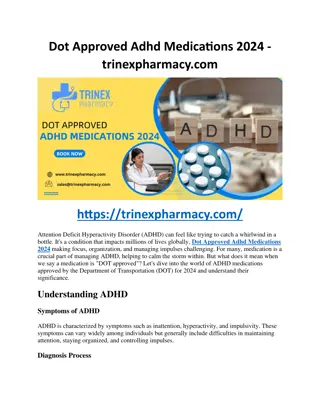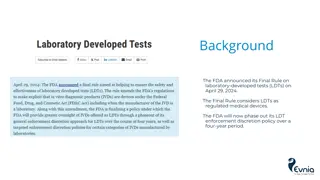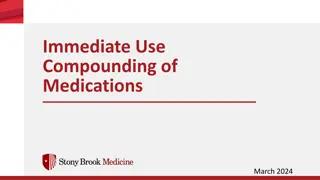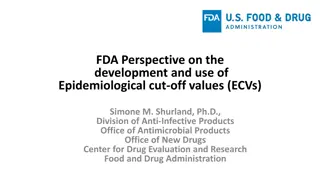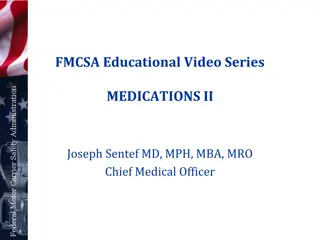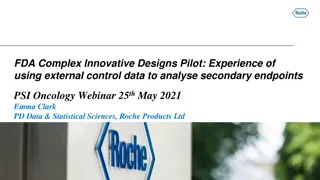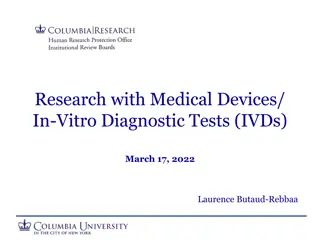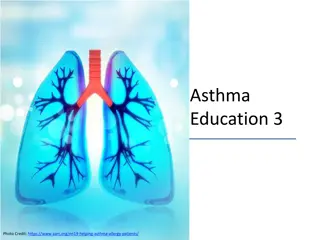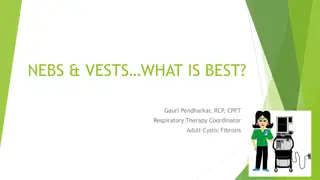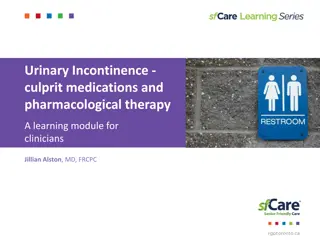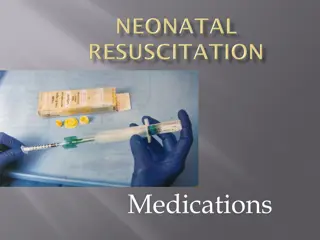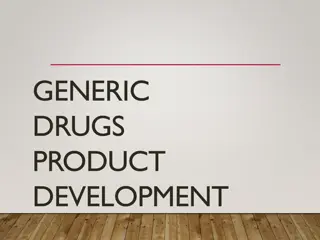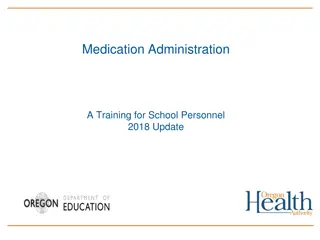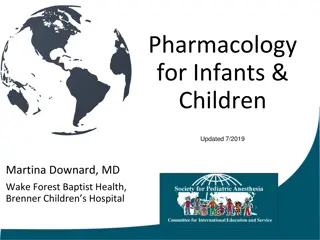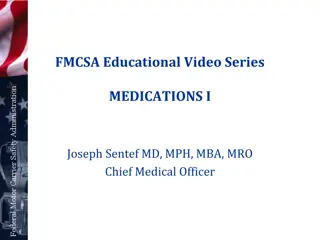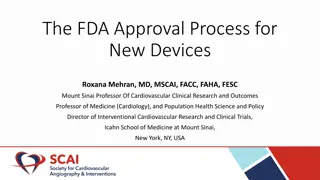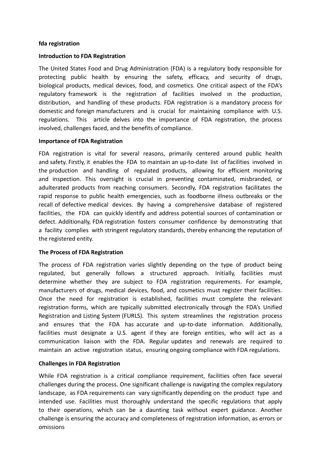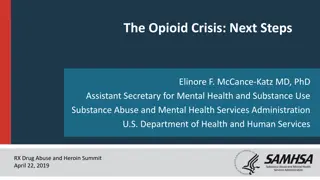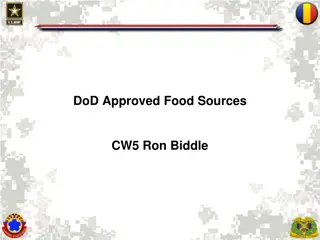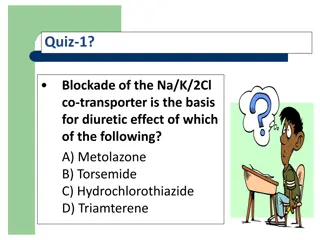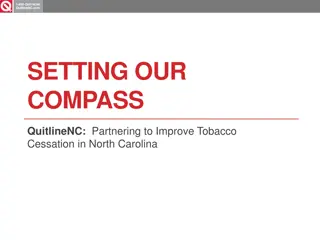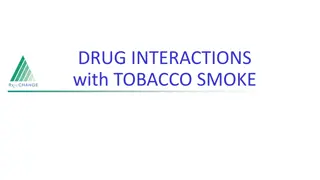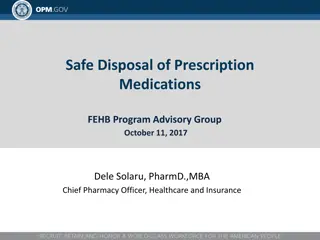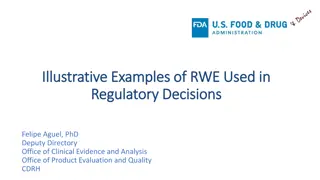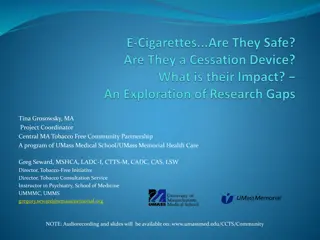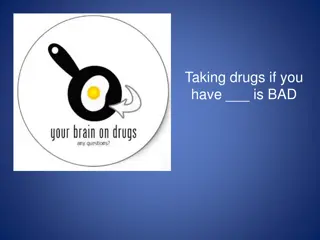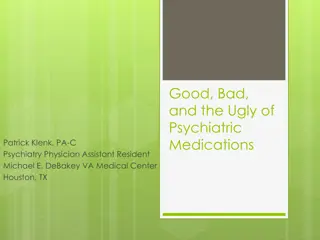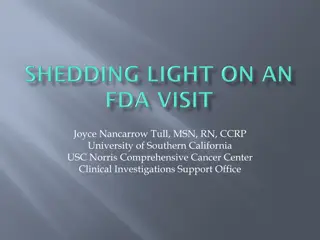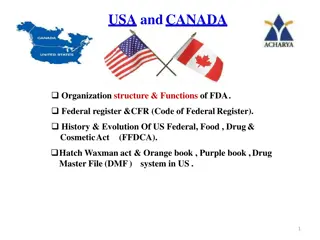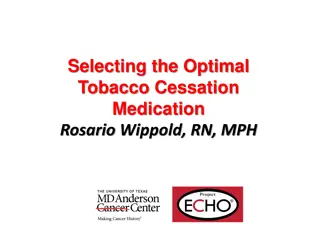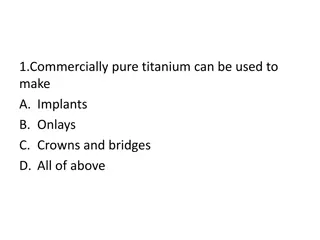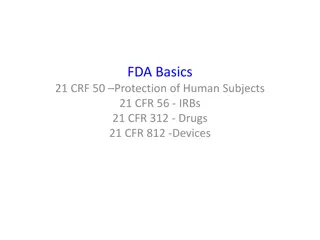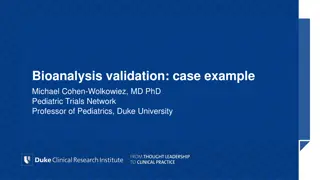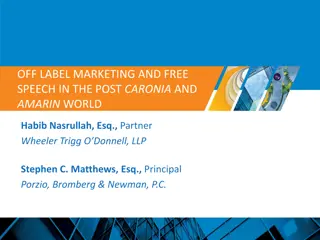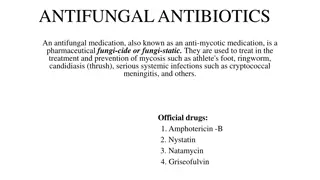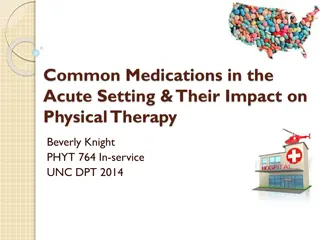Introduction to Flood Risk Assessment with HEC-FDA Overview
This presentation delves into flood risk assessment using HEC-FDA software, covering topics such as defining flood risk, components of uncertainty, consequences of flood risk, and methods to assess flood risk including hydrology, hydraulics, geotechnical, and economics. It explores the intersection
6 views • 39 slides
Do I need an inspection by a SEMA Approved Rack Inspector?
HSE recommends that British warehouses receive an annual racking inspection from a SEMA approved racking inspector. But what counts as a warehouse in HSE\u2019s eyes? Does your business need a an inspection by a SEMA Approved rack inspector?\n\n\/\/seerackinginspections.co.uk\/do-i-need-a-sema-appro
1 views • 3 slides
Dot Approved Adhd Medications 2024 - trinexpharmacy.com
Attention Deficit Hyperactivity Disorder (ADHD) can feel like trying to catch a whirlwind in a bottle. It's a condition that impacts millions of lives globally, Dot Approved Adhd Medications 2024 making focus, organization, and managing impulses challenging. For many, medication is a crucial part of
5 views • 7 slides
FDA's Final Rule on Laboratory-Developed Tests (LDTs) and Phase-Out Policy
The FDA announced its Final Rule on laboratory-developed tests (LDTs), considering them as regulated medical devices. The phased-out policy will gradually enforce compliance with premarket review, quality system regulation, and other requirements over several stages. Additionally, a limited enforcem
0 views • 6 slides
Immediate Use Compounding of Medications - Guidelines and Procedures
Immediate Use Compounding of Medications involves preparing sterile medications outside the pharmacy in urgent situations to avoid delays in patient care. This process requires following specific criteria, maintaining aseptic technique, and ensuring proper labeling. It excludes acts like reconstitut
0 views • 13 slides
FDA Perspective on Epidemiological Cut-off Values (ECVs)
The FDA presents insights on the development and use of Epidemiological Cut-off Values (ECVs) to distinguish wild-type populations from those with acquired resistance mechanisms. ECVs are crucial for determining antimicrobial susceptibility and guiding treatment decisions. The process involves analy
0 views • 13 slides
Understanding Medications and Their Effects in DOT Driver Exams
This educational video series, presented by Dr. Joseph Sentef, Chief Medical Officer, covers medications commonly encountered during DOT driver exams. It addresses a range of medications like antipsychotics, antidepressives, and bipolar drugs, discussing their side effects, interactions, and appropr
0 views • 32 slides
Experience in FDA Complex Innovative Designs Pilot Meeting: Incorporating External Controls in Phase 3 Study for DLBCL
Explore the experience of participating in the FDA's CID Pilot Meeting, focusing on designing a Phase 3 study for DLBCL with an external control arm for secondary overall survival. Discover key considerations for future studies with external controls to address high unmet medical needs in DLBCL pati
0 views • 13 slides
Understanding FDA Regulations and Medical Device Classification
The Food and Drug Administration (FDA) plays a crucial role in regulating research, manufacturing, marketing, and distribution of medical devices. Medical devices are classified based on risk and intended use, with three main categories determining regulatory pathways. The classification system help
2 views • 27 slides
Understanding Asthma Medications: Maintenance vs. Rescue
Asthma, a chronic condition, can be managed with two main forms of medications - maintenance and rescue. Maintenance medications are taken daily to prevent symptoms, while rescue medications are used as needed during asthma flares. Overusing rescue medications can reduce their effectiveness, so it's
0 views • 16 slides
Optimizing Respiratory Therapy for Adult Cystic Fibrosis Patients
Creating an effective daily respiratory therapy regimen is crucial for adults with Cystic Fibrosis (CF) to maintain healthy lungs and good lung function. This includes inhaled medications such as nebulizer treatments and bronchodilators, airway clearance techniques like the Vest and Pep devices, as
0 views • 32 slides
Understanding Medications and Pharmacological Therapy for Urinary Incontinence
This learning module for clinicians discusses the physiology of bladder control, age-related changes in the genitourinary system, medications that contribute to urinary incontinence, pharmacological treatments for UI, side effects of medications used for UI, and a senior-friendly approach to optimiz
0 views • 30 slides
Neonatal Medication Administration and Resuscitation Overview
Neonatal resuscitation may involve administering medications like epinephrine and volume expanders in specific situations such as hypovolemic shock. Before giving medications, ensure proper ventilation and compressions. Epinephrine helps with coronary artery perfusion and oxygen delivery, while volu
1 views • 15 slides
Understanding Generic Drugs and Brand Name Medications
Generic drugs are identical copies of brand-name medications in dosage, strength, quality, and intended use. They contain the same active ingredients but are sold under their chemical name. This article explores the basic differences between generic and brand-name drugs, when generic drugs are marke
0 views • 20 slides
School Medication Administration Training Guidelines
Legal requirements and policies for administering medications in schools are outlined, including training for designated personnel and procedures for student self-medication. The guidelines cover medication administration during school activities, transit, and before/after-school care for students w
0 views • 34 slides
Pediatric Pharmacology Update: Perioperative Medications in Infants and Children
Gain insights on frequently used medications in the perioperative period for infants and children, including anesthesia medications. Explore pharmacokinetics, drug distribution in neonates, and the effects of common anesthesia agents on pediatric patients. Understand how immature kidney or liver fun
0 views • 43 slides
FMCSA Educational Video Series - Medications I by Joseph Sentef, MD, MPH, MBA, MRO
This educational video series covers various medications commonly encountered by medical examiners during DOT driver exams. It addresses medications such as amphetamines, benzodiazepines, opioids, and more, discussing their side effects, drug interactions, and regulations related to driver qualifica
0 views • 37 slides
Understanding the FDA Approval Process for Medical Devices
The FDA approval process for new medical devices involves rigorous evaluations to ensure safety and effectiveness. Conflicting criticisms of the FDA focus on the balance between tightening or loosening regulations without compromising public health. The agency's mission emphasizes protection and adv
0 views • 19 slides
fda registration
IAS helps organizations to register their products in US FDA. It is always a tedious process to collect and file the application as the US-FDA has got stringent rules. We are having experience in US-FDA registration thus we put forward our Services t
3 views • 2 slides
Addressing the Opioid Crisis: Next Steps and Federal Resources
The opioid crisis continues to affect millions, with a significant decrease in misuse reported. The fight against this crisis involves federal resources such as grants, MAT programs, and support for prevention, treatment, and recovery services. Evidence-based treatment includes FDA-approved medicati
2 views • 15 slides
Approved Food Sources for Armed Forces Procurement
The Worldwide Directory of Sanitarily Approved Food Establishments provides a comprehensive list of approved food sources for Armed Forces procurement, audited for sanitation and quality. Suppliers seeking approval must follow specific requirements outlined in the directory to become eligible for bi
0 views • 14 slides
Diuretic Mechanisms and Medications: Quiz Questions and Answers
Explore a series of quiz questions focusing on diuretic medications, their mechanisms of action, and clinical scenarios. Topics include the diuretic effects of specific medications, management of idiopathic hypercalciuria, drug interactions in elderly patients, effects of loop diuretics on ionic exc
0 views • 10 slides
Enhancing Tobacco Cessation Efforts in North Carolina
Partnering with QuitlineNC is key to improving tobacco cessation in North Carolina. Research shows that a combination of evidence-based coaching and FDA-approved medications is most effective. Cessation benefits should encompass various treatments while avoiding common barriers. Success rates can be
0 views • 14 slides
Interactions of Tobacco Smoke with Medications: Effects and Recommendations
Drug interactions with tobacco smoke can impact the pharmacokinetics and pharmacodynamics of various medications. Tobacco smoke constituents can induce enzymes that affect the metabolism of drugs, leading to altered therapeutic responses. For example, CYP1A2 enzyme induction by tobacco smoke can dec
0 views • 6 slides
Safe Disposal of Prescription Medications: Importance and Methods
Proper disposal of prescription medications is crucial to prevent harm to children, pets, and the environment. Safely dispose of unused medications to avoid accidental poisoning, misuse, and pollution of water sources. Methods include using authorized collectors, pharmacies, and take-back events, an
0 views • 5 slides
Examples of Real-World Evidence in Regulatory Decisions by FDA
FDA showcases illustrative examples of how Real-World Evidence (RWE) has been utilized in regulatory decisions, highlighting its value across different submission types, data sources, and purposes from FY12-FY19. The FDA report features cases like a modified hemodialysis catheter end cap, tumor prof
0 views • 14 slides
Unregulated Risks of E-Cigarettes: FDA and Safety Concerns
E-cigarettes, unregulated and not FDA-approved, pose health risks with potential carcinogens and toxic chemicals. Lack of oversight allows for manufacturers to sell products with varying safety standards. FDA testing has revealed concerning findings, yet regulations are limited in addressing key iss
0 views • 40 slides
Substance Abuse Treatment Strategies and FDA-Approved Medications
Explore the various substance abuse treatment approaches, including psychological and pharmacological interventions, along with FDA-approved medications like disulfiram, naltrexone, and buprenorphine. Learn about the challenges in substance abuse treatment and the psychology of substance users. Disc
0 views • 13 slides
Understanding Psychiatric Medications: The Good, The Bad, and The Ugly
Delve into the complexities of psychiatric medications with a focus on the benefits, risks, and side effects associated with antidepressants, mood stabilizers, antipsychotics, and anxiolytics. Learn about common lab monitoring needs, drug interactions to watch for, and important considerations when
0 views • 36 slides
Expert Tips for Successful FDA Inspections
Gain insights from Joyce Nancarrow Tull, an experienced professional, on navigating FDA inspections successfully. Learn about legal authority, inspection procedures, key strategies, and more. Be proactive, seek expert advice, and build knowledge to enhance your readiness for FDA audits.
0 views • 31 slides
Understanding the Structure and Functions of FDA in the USA and Canada
The Food and Drug Administration (FDA) in the USA is a critical agency within the Department of Health and Human Services responsible for regulating the safety of various products such as foods, drugs, medical devices, and cosmetics. The FDA has distinct organizational units like the Office of the C
0 views • 49 slides
Tailoring Tobacco Cessation Medications for Optimal Results
Selecting the best tobacco cessation medication involves considering individual medical, psychological, and social needs. Various FDA-approved options include Nicotine Replacement Therapy (NRTs), Varenicline (Chantix), and Bupropion (Wellbutrin, Zyban). Screening patients is crucial to ensure safe u
0 views • 14 slides
Dental Materials Overview and Standards
Dental materials play a crucial role in various dental procedures such as implants, onlays, crowns, and bridges. Different materials like titanium and ceramics are utilized, with standards set by organizations like the ADA, ISO, and FDA. Safety and quality assurance are vital for restorative dental
0 views • 10 slides
Understanding FDA Regulations in Clinical Research
FDA regulations in clinical research cover the protection of human subjects, IND/IDE requirements, risk determinations, application processes, and what falls under FDA regulation. It distinguishes between FDA-regulated activities and those not regulated, such as medical record reviews. The scope inc
0 views • 31 slides
Bioanalysis Validation Case with Michael Cohen-Wolkowiez at Duke University
Michael Cohen-Wolkowiez, MD PhD, a Pediatric Trials Network Professor at Duke University, conducted a bioanalysis validation case study involving Meropenem in infants funded by NIH. The study focused on PK and safety data for FDA registration consideration. High-level results showed significant diff
0 views • 6 slides
Off-Label Marketing and Free Speech in the Post Caronia and Amarin World
Background of off-label use and prohibition, First Amendment challenges to FDA authority, next steps for industry and FDA in responding to the new legal landscape. FD&C Act prohibits misleading labeling, FDA's regulatory authority on drug and device promotions, FDA's view on off-label promotion proh
0 views • 19 slides
Understanding Biosimilars: Tools for Analytical Similarity
Explore the world of biosimilars, the complexities of comparing generic and brand drugs, FDA regulations, and the first FDA-approved biosimilar. Learn about biological products, the Biologics Price Competition and Innovation Act, and the challenges in defining potency, purity, and stability in biolo
0 views • 26 slides
Overview of Antifungal Antibiotics and Their Uses
Antifungal antibiotics are crucial medications used to treat and prevent various fungal infections such as athlete's foot, ringworm, candidiasis, and systemic infections like cryptococcal meningitis. This article discusses key antifungal medications including Amphotericin-B, Nystatin, Natamycin, and
0 views • 6 slides
Lowered Endothelial Damage in African Americans Linked to Cocaine Abstinence
Cocaine use is a significant public health concern in the US, affecting many communities. A preliminary study by Johns Hopkins School of Medicine suggests that abstaining from cocaine and reducing its use may lead to decreased endothelial damage in African Americans. FDA has not approved medications
0 views • 32 slides
Medications in Acute Care: Impact on Physical Therapy
Side effects of medications in the acute setting can manifest as impairments in various body systems, including integumentary, musculoskeletal, cardiovascular/pulmonary, and neuromuscular systems. Factors influencing adverse drug events include pharmacokinetics, drug interactions, and patient-specif
0 views • 24 slides


